- Home
- Dusty Richards
Massacre at Whip Station Page 2
Massacre at Whip Station Read online
Page 2
More likely, though, the pursuers didn’t want to be delayed by him and then have to shoot it out closer to the station. The O’Malley reputation for strong justice was known to most around these parts.
The young rider turned so that he was parallel with the stagecoach driver. The curtains inside the carriage were drawn and he had no idea who was inside. There was nothing but cargo in the rear box. He had guessed as much from how low the coach was riding. The extra lower paying passenger or two who could be tucked in there tended to be smaller and lighter.
Slash narrowed the distance between them, quickly coming up alongside B.W. Beauregard Lafayette. He noticed that Dick Ocean was listing toward the center of the box, the spot where the driver kept his Bible. That explained why the stage wasn’t returning fire. Even from this low angle, Slash could see that the man was not carrying his carbine.
“Dick hurt bad?” Slash called up, rising in the saddle.
“Thigh,” B.W. answered in his lightly accented Southern voice.
Ocean said something that Slash could not hear.
“Says he took the shot for me,” B.W. remarked.
“He have a choice?” Slash joked.
B.W. made a long face and shook his head once.
“I’ll ride ahead and let Ma know you’re coming in wounded,” Slash said, hunkering back down beside Young Thunder’s neck. Before he rode off he asked, “Any idea who they were?”
“Not a noontime shadow of a clue,” B.W. replied.
“Cargo? Passenger?” Slash asked.
“Passenger only possibility,” B.W. replied, whipping the horses up. “Tell you more around some coffee.”
Slash holstered his gun and threw B.W. a small salute. As he rode ahead of the team, he dragged a bare hand across the neck of the lead horse as he passed. Most people who did not spend much time in the saddle were unaware how much horses and dogs appreciated gestures like that after a hard run.
Pushing Young Thunder ahead of the coach team, Slash made for the large stacks of boulders that marked a natural passageway. The iron supports and wooden sign announced Whip Station just beyond.
The young man felt a deep sense of calm envelop him whenever he passed that threshold. That was especially true when the late afternoon sun was starting its final descent, as now. The winds changed. The day and its denizens—including the damned turkey—would be turning over the land to the creatures of the night. There was a sense of change everywhere he looked, listened, smelled.
Behind him, in the still-day-lit wilderness, Slash had to be constantly on guard. He had been out there a little over two hours, riding and then hunting. He stayed sharp by slicing cacti from horseback at a gallop, then turning and stabbing the severed pieces with his knife. In the open, there was danger from many quarters—human, animal, and element. But here, beyond the rock entrance, was safety and home. It was a feeling most Butterfield travelers experienced as well after their arduous journey from the last stop, in Vallicita. That timber and adobe structure—a long, flat shack with a well that tended to go dry every summer—was more than a day distant. It had been bought about a year earlier by a Southern transplant, a dandy named Brent Diamond, who showed up with his Colored lady and her boy. In terms of comfort, Whip Station was what B.W. once described as “a gift from God and St. Christopher to California.”
However, as Slash rounded the innermost of the boulders, he saw something he was not expecting to see.
Outside the solid log structure, just beyond the inviting porch with its wooden benches, Grandpa Joe was talking to two men. They were familiar Mission Indians—one Yaqui, one Chumash—of the 1st California Cavalry Battalion.
Their presence was not likely sociable.
CHAPTER 2
Joe’s hearing wasn’t what it used to be, but he thought he had heard shots. The two Indians who were with him also turned in the direction of the flatlands beyond the station.
There were a lot of things out here that could sound like gunfire. Rocks hitting one another as they tumbled from a ridge. A whip cracking, then cracking again. A tree snapping, the branches cracking as it uprooted. With the echo and each sound stepping on the one before it, it was difficult to say.
The thing to pay attention to was whether the sounds happened again. They did not. There was no need for Joe to retreat to the station, to the door frame that was his usual spot to protect the women and seek cover, if needed.
Maybe Slash gave up and just plugged that bird he was talking about, Joe thought. That was the difference between man and wild turkey. We have more twists and turns in our kit.
Joseph James O’Malley was six-foot-three, seventy years old, with a ramrod straight posture and steel gray eyes. He was described by those who knew him as “that bull with the leather face and broom mustache.” Joe didn’t look anything like a bovine, save for his scowl, but maybe that was enough. A frontiersman didn’t survive for very long without a strong, set, immediately threatening look.
“In that respect,” his granddaughter Gert said when he turned his present age, “you do ‘cow’ other men.”
Joe didn’t like when people laughed at him, but there and then, at his party, it was good to laugh with family.
The “cowing” look worked on Red Men just as well as mountain lions, and it had helped Joe survive this man-killing land before it was even a little tamed.
For decades, the North Kansas–born frontiersman had been a scout. First for surveyors from the East, then for the military hunting Indians, and then for John Butterfield and his American Express Company. During that time he had endured desert and frostbite, war and savages, and gunslingers representing rival interests. In 1857, looking for an adventure westward, he went to work for the newly born Butterfield Overland Mail Line. Back then, when way stations were still in the talking stage, Joe staked a claim on this one for his son and daughter-in-law. But then he got to thinking about it.
There had been letters, a lot of them, between him and his young cousin Long O’Malley about joining their ranching operation in Texas. After a big cattle sale in Abilene, the O’Malley kin were building a family ranch—and probably a family empire—back in Texas. They were going to need good men and, looking ahead, their families as well.
While cattle was lucrative, and growing fast, ranching didn’t seem right for Joe or for his son Jackson. Not after the younger O’Malley—a wrangler, then—fell from a horse and busted his leg. It set crooked and ended his career. Besides, though Texas was big open country, what Joe had seen of California while scouting was something more to his liking. It had mountains and water, sun and nourishing, cleansing gully washers of rain—and best of all, the smell of ocean coming from somewhere to the west.
The far west called to him. It called to Jackson. And it called to Jackson’s devoted wife, Sarah.
Plus, here at the way station, Joe got to meet interesting people. Some of them were just passing through on the stage, everyone from actors to scientists. Some worked for Butterfield, like B.W. and Dick Ocean. Then there were others who were stationed out west by the federal government like Sisquoc and Malibu, who sometimes came just to visit but this time had come on the kind of mission Joe hated down to his knees.
The men made a striking contrast as they stood there. Joe wore the buckskins that made up the bulk of his wardrobe, save for the suit he wore whenever he went to the bank in San Diego or to church. The Indians were dressed in the dark blue jackets of the battalion but wore their own black trousers and hats. The tall, lean Sisquoc had on a brown beaver fur felt hat with an eagle feather in the band. Malibu, the Chumash, was a short, wide man who wore a white hat with a downturned ranch brim.
The three men were just outside the fence that ran along the front of the station. There were cowbells attached its entire len’th. Struck with a stick or the toe of a boot they’d frighten owls that hooted on the chimney or coyotes that crept toward the barn with ill intent. They also warned if a wind was building, the kind that could tear unfasten
ed shutters from a window or carry uncooped chickens from the yard.
Farther toward the entrance of the compound, a few paces beyond the fence, was the sun-bleached trough and hitching post. In the back was the well, the barn with chickens and a milk cow, the stable, and Sarah’s bountiful vegetable garden and apple trees. Jackson O’Malley was out back expanding the irrigation ditches for new plantings, digging down in a method of his own invention. Sarah and Gert were inside preparing to welcome the stage riders.
The attention of the three men was drawn to the south and the rock entrance as Slash galloped through. From inside the house, the two O’Malley collies—named Blood and Mud, after who liked to hunt and who liked to loll about—barked at the sound of pounding hooves. Joe’s shotgun was never far from his reach. It was leaning against the trough and he went and picked it up now, his strong fingers wrapped tight around the barrel. His grandson didn’t ride like that unless there was trouble, and the only trouble there could be right now likely involved the incoming stage.
Now Joe and the Indians were sure that what they heard were shots. The shotgun pointed down, Joe excused himself from his guests and walked toward the rider.
“Son?” he said. Joe’s voice was a throaty rasp. It was a growl that came, his wife Dolley used to tease, from occasionally swallowing the cacti he chewed for moisture in the field.
“Stage is coming in bloody,” Slash said breathlessly. He reined Young Thunder and dismounted in the same fluid move. “Ocean’s leg, gunshot.”
“Who by?” Joe asked.
“Two riders, white. That’s all I saw.”
“Were you followed?”
Slash shook his head.
“Did anyone fire from the coach, Mr. Slash?” Malibu asked.
“Not that I saw, sir,” Slash replied.
Joe stepped aside as his grandson ran toward the station. He slowed at the door and quickly brushed the dust from the front of his trousers before entering. Hard riding caused a man to get dusty up front, and his mother appreciated a man who did not add to her work.
The older man’s gray eyes shifted toward the Mission Indians. They were men born on one of Southern California’s fifteen Franciscan missions, where their parents had lived and worked. In Joe’s experience, few bore more than a passing allegiance to the tribes of their ancestors. Though there were those in the cavalry who worried that they’d revert to tribal alliances in the event of war, that had never been the case.
“That fracas have anything to do with the passenger you was talking about?” Joe asked.
It wasn’t so much a question as a statement.
“It is possible,” Malibu said, showing concern. “We were told there would be agents with him. The commander at Fort Mason does not trust Easterners. That is why he sent us to meet the stage here.”
“Why here? Why not back at Vallicita?” Joe asked.
“General Williams’s authority ends here,” Malibu said. “General Guilford owns rest.”
The onetime frontiersman set the shotgun back against the fence and peered out at the plain. The sinking sun threw a tawny orange on the plumes of dust B.W.’s team was now kicking up.
“Why don’t you two go inside, have some coffee?” Joe said to the Indians. “Sarah made it, not Gert, so you know it’s strong, the way you like it. I’ll be along presently.”
The two men left without comment. Joe had no idea who the other passengers were. Usually, they were Easterners who only knew about the West what they read in Indian Jim or the other one Gert read aloud and laughed her way through, Maleska, the Indian Wife of the White Hunter. Tired, rattled, cramped, and now gun-shot passengers might not take well to seeing Indians, even those who were in U.S. Cavalry uniforms.
The Indians went around the fence, to the back of the station where they were out of sight. ’Round this time the back door would be in shadow. The Indians could still look in through the back door without being clearly seen.
Joe turned and started toward the bouldered entrance. He walked with a side-to-side gait—just like a sailor, according to a sea captain who had stopped a few weeks before on his way to the Barbary Coast. The sway was a habit that many frontiersmen acquired crossing rocky terrain, where shifting posture was necessary to keep from falling. He smiled inside as he remembered Dolley stealing what she thought were hidden glances at his back as he walked. They never stopped admiring one another, right up until . . .
He winced at the sharp, sudden reminder of the emptiness between his strong arms. He took his mind somewhere else. Anywhere else. At the len’thening shadows to his left. The loss, four years removed, was still terrible to him. He knew, from the grief of his own mother and her father before her that the hole in the world would never be filled, would follow him around like his shadow in the dirt.
Joe raised his moist eyes, looked at distant, snowy mountaintops to the right, watched how the sinking sun caused them to glow like a fuse. Remembering Dolley was like a card sharp’s sleight of hand. He cherished the vivid thoughts of his wife . . . but then they were pushed aside by a combination of will and necessity, by the immediacy of whatever it was he had to do. Even when Dolley was alive and young and he was away for months, he could not afford to let his mind roam like a lazy-circling eagle. That was how outlaws or mountain lions or a gopher hole got you. That was why he still moved like he was crossing a field of rocks. Because a man who lost his balance was food for buzzards.
Joe was hatless, his gray hair slicked back with perspiration. He raised his right hand like he was saluting low, shielding his eyes from the sun as he watched the stagecoach. The sun struck the front box full-on. Ocean was leaning toward B.W. like a swooning dame and the horses were even less a team than usual when they arrived. Brother Whip had driven them hard.
The rumble of the hooves and wheels came like the drum of approaching rain in the woods—faintly in the distance, then hammering the canopy of leaves, then suddenly all around you. There was not a great deal of room between the rocks and the fence. The coach always had to turn east, then sharp to the west to deposit passengers at the cowbell fence. As usual, as the team went into its turn, Joe matched the pace of the lead horse on the left and swung onto its back to help slow the animals as B.W. applied the brake. The stagecoach stopped with a jerk and a loud, complaining shifting of its cargo and passengers.
Slash came running out as Joe dismounted, both of them hastening to the shotgun side of the box, which was facing the front of the station. Sarah and Gert hurried out to see to the passengers—and to position themselves between them and the bloodied man.
“Hold off,” B.W. said to the women as they approached. “Got an order.”
“From who?” Joe asked as he stepped on the wheel hub to reach Ocean.
“Not that kind,” an exasperated B.W. told the women. “Just let them that are inside handle this.”
Sarah and Gert stepped two paces back from the coach to allow the door to swing open. As they did so, B.W. helped pass the injured Ocean to Joe and Slash. Jackson had come from the stable to see to the team. Seeing his wife just waiting, the middle O’Malley stood back and did the same. After Ocean had been eased down, Gert followed the men back into the house to arrange for treating the gunshot wound.
While Ocean had been seen to, Sarah watched the unmoving curtains inside the stagecoach. It was unusual for at least one of the two facing passengers on that side not to pull open the drape and have a look.
In the nearly two years that she had been the mistress of the Whip Station, Sarah had never known who was going to emerge from the coach. Butterfield did not share its passenger list with the stations and did not ask for or expect special treatment for anyone. All those who came to Whip Station got the same food and drink, used the same outhouse, washed from the same basin, enjoyed the same general courtesy as every other passenger. On occasion, someone driven a little loco by the cramped, humid, airless conditions of the coach needed extra care. They got a bed to lie down in—the one Ocean would
be using—and were permitted a walk through the barn or stable if they needed privacy. There was nothing more the O’Malleys could do in a short hour.
About half the time, Sarah saw the same people coming and going. They were usually folks on business or visiting kin. They were usually fresher going back than coming in. Many learned, by hard experience, what to wear and how to amuse themselves for the return trip.
Families looking to settle down here still came mostly by wagon. When they happened by, and maybe didn’t have enough—or any—silver to pay, the O’Malleys took pains to accommodate them as well. They knew what it was like to be wandering.
Finally, there was the distinctive snap of the door handle releasing the sturdy catch. It swung out and the stairs were lowered from the dark inside.
The first passenger out was a tall, clean-shaven, rosy-cheeked, barrel-chested man wearing a tan, rumpled tweed suit. As he stepped heavily down the two creaking stairs, he pressed a blue Civil War fedora firmly on his head. He took a moment to adjust it to block the sinking sun. The hat did not look battle-worn, Sarah thought. It seemed new, something left over from the stores of the Union Quartermaster General. Something you wore to announce your affiliation, not your experience.
The man was about forty and sandy haired with a critical expression that seemed carved into his forehead and jowls. He stood for a very long moment facing the rock entranceway before looking around. He noticed Sarah and acknowledged her with a nod and a gentlemanly tip of the hat.
Eastern manners, she thought. A man from the South would have bowed.
A hand attached to a long arm stretched from the darkness of the coach. It handed the man a gun belt, which the big man put on. He made sure the shiny Colts drew easy. They, too, looked fresh and untested. Whatever experience this man had with them seemed to come from a gun range, not peacekeeping or combat. He was assembled to look intimidating.
Without taking his eyes from the horizon beyond the boulders, the big man half turned toward the darkness within the stagecoach.

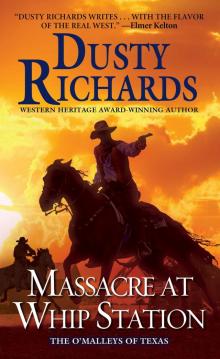 Massacre at Whip Station
Massacre at Whip Station Blue Roan Colt
Blue Roan Colt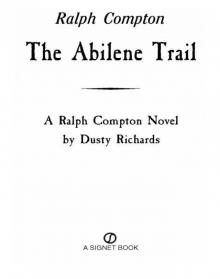 The Abilene Trail
The Abilene Trail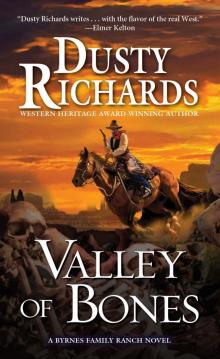 Valley of Bones
Valley of Bones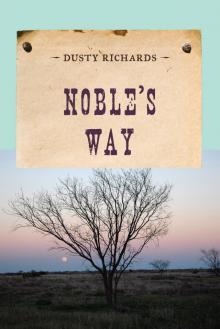 Noble's Way
Noble's Way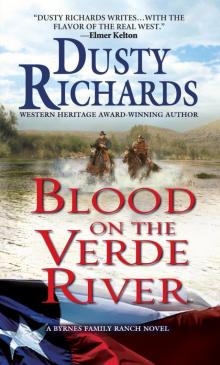 Blood on the Verde River
Blood on the Verde River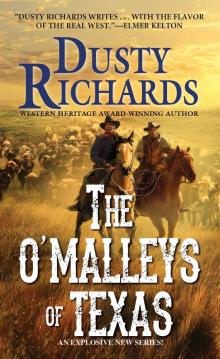 The O'Malleys of Texas
The O'Malleys of Texas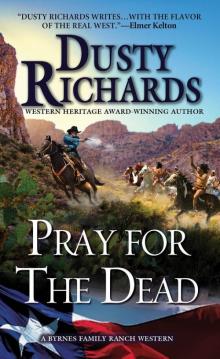 Pray for the Dead
Pray for the Dead Arizona Territory
Arizona Territory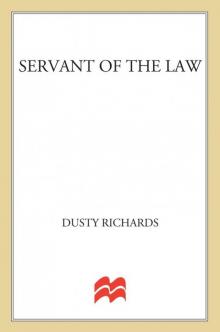 Servant of the Law
Servant of the Law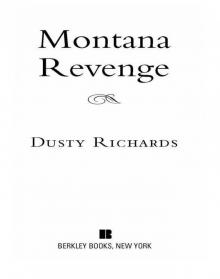 Montana Revenge
Montana Revenge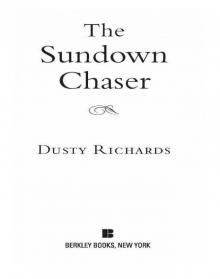 The Sundown Chaser
The Sundown Chaser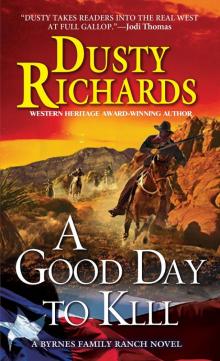 A Good Day To Kill
A Good Day To Kill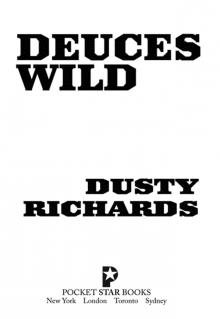 Deuces Wild
Deuces Wild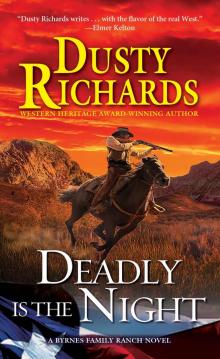 Deadly Is the Night
Deadly Is the Night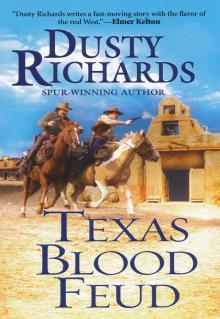 Texas Blood Feud
Texas Blood Feud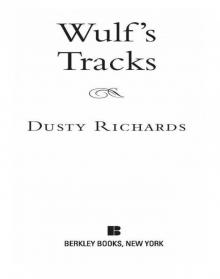 Wulf's Tracks
Wulf's Tracks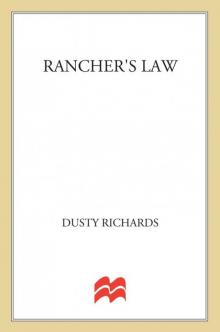 Rancher's Law
Rancher's Law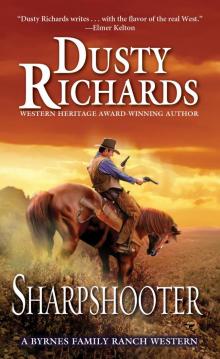 Sharpshooter
Sharpshooter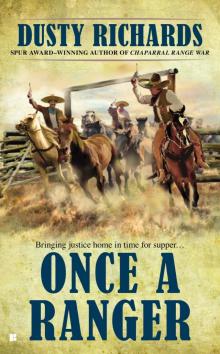 Once a Ranger
Once a Ranger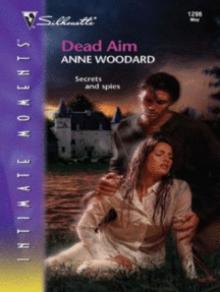 Dead Aim
Dead Aim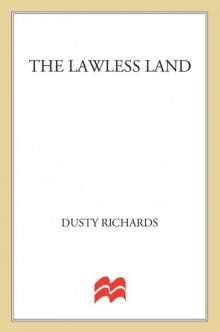 Lawless Land
Lawless Land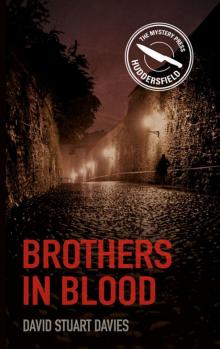 Brothers in Blood
Brothers in Blood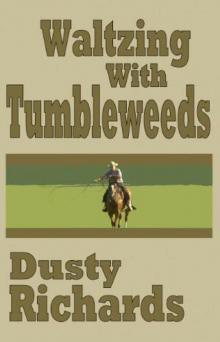 Waltzing With Tumbleweeds
Waltzing With Tumbleweeds